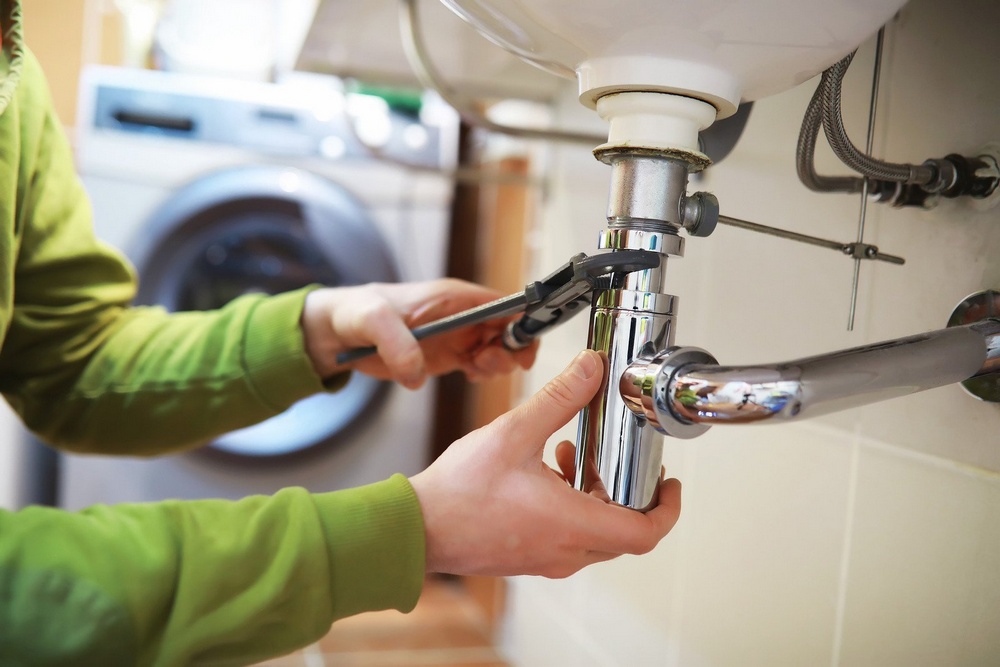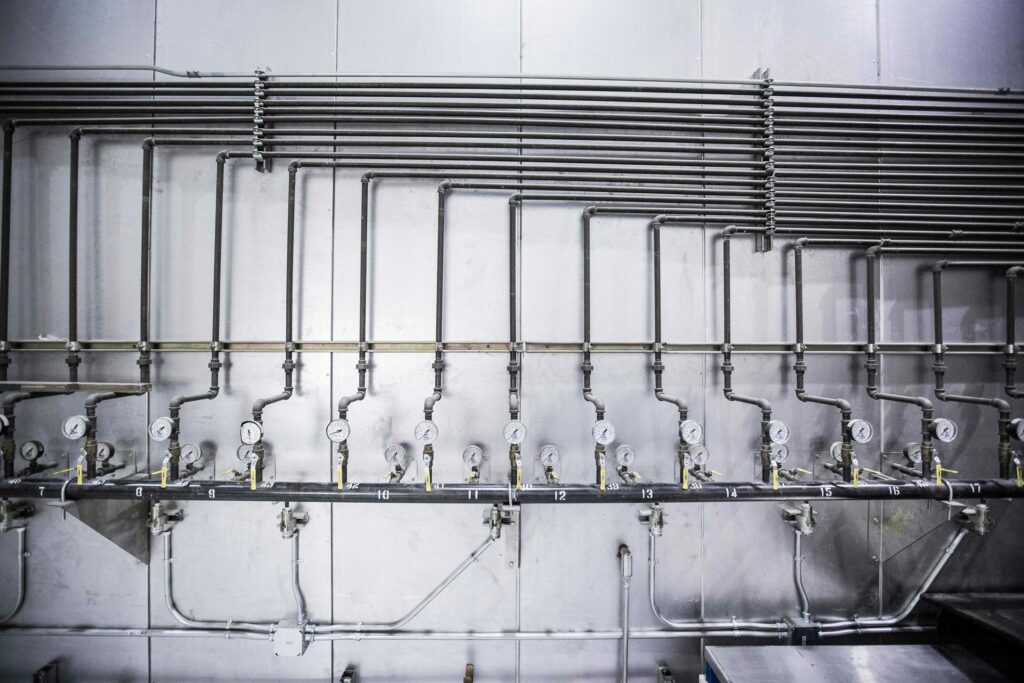
Image Source: Wave Plumbing
Plumbing is a complex yet essential system in any home, comprising pipes, valves, fixtures, and other apparatuses for water distribution and waste removal. Understanding the basics of plumbing is crucial for any homeowner, as it helps in identifying potential issues early on. The primary components of a residential plumbing system include the water supply system, the fixtures and faucets, and the drainage system. Each plays a vital role in ensuring that water flows efficiently in and out of your home.
Knowing how these components work together can simplify troubleshooting common plumbing issues. For instance, the water supply system brings fresh water into the house, while the drainage system carries wastewater away. Between these systems are various fixtures—like sinks, toilets, and showers—that provide access to water for daily use. Recognizing how these elements interact can empower homeowners to make informed decisions about maintenance and repairs.
Lastly, it’s essential to familiarize oneself with the layout of your home’s plumbing system. This includes locating the main water shut-off valve, knowing the location of various access points for cleaning drains, and understanding which fixtures are connected to which pipes. This knowledge not only aids in routine maintenance but also becomes invaluable during emergencies.
Common Plumbing Issues Homeowners Face
Homeowners often encounter several common plumbing issues, such as leaky faucets, clogged drains, and running toilets. Each of these problems, while seemingly minor, can lead to significant waste and increased utility bills if not addressed promptly. Leaky faucets, for example, can waste gallons of water over time, while clogged drains can result in slow drainage and unpleasant odors.
Another frequent issue is low water pressure, which can be caused by a variety of factors including clogged pipes, faulty pressure regulators, or issues with the water supply line. Identifying the root cause of low water pressure is essential for restoring normal flow and ensuring that showers, faucets, and other fixtures operate efficiently. Simple solutions, like cleaning aerators or checking for leaks, can often resolve these problems quickly.
Water heater malfunctions are also a common concern for homeowners. These can manifest as inadequate hot water supply, unusual noises from the heater, or even leaks around the unit. Regular maintenance, such as flushing the water heater to remove sediment buildup, can prolong its lifespan and improve performance. However, understanding when a problem requires professional intervention is crucial to prevent further damage.
Essential Plumbing Tools Every Home Should Have
Every household should be equipped with a basic set of plumbing tools to handle minor repairs and maintenance tasks. These tools can save time and money by allowing homeowners to address small issues before they escalate. A few essential tools include a plunger, pipe wrench, basin wrench, and pliers.
A plunger is indispensable for clearing clogged toilets and drains. There are different types of plungers for sinks and toilets, so it’s beneficial to have both on hand. Pipe wrenches are another must-have, as they provide the necessary grip to tighten or loosen pipes and fittings. Basin wrenches, with their long handles and adjustable jaws, are ideal for reaching and tightening nuts under sinks.
In addition to these, pliers—especially tongue-and-groove pliers—are versatile tools useful for gripping, twisting, and pulling. A plumber’s tape, also known as Teflon tape, is crucial for ensuring tight seals on threaded pipe connections. Having a drain snake or auger can also be beneficial for clearing stubborn blockages that a plunger cannot handle.
DIY Plumbing Tips for Minor Repairs
Many minor plumbing issues can be addressed with some DIY know-how and the right tools. When it comes to leaky faucets, often the problem lies with a worn-out washer or O-ring. By turning off the water supply and disassembling the faucet, homeowners can easily replace these components and stop the leak.
Unclogging a drain is another common DIY task. For minor clogs, a combination of baking soda and vinegar followed by hot water can often clear the blockage. For more stubborn clogs, a plunger or a drain snake can be used to remove the obstruction. Regular maintenance, such as cleaning hair traps and avoiding pouring grease down the sink, can prevent these clogs from occurring.
To fix a running toilet, check the flapper valve, which might be worn out or misaligned. Replacing the flapper is a straightforward process and can be done without professional help. For more persistent issues, such as problems with the fill valve or float, consulting a repair guide or watching instructional videos can provide guidance.
When to Call a Professional Plumbing Company
While DIY solutions work for minor issues, certain situations require the expertise of a professional plumbing company. Persistent leaks, significant water damage, or complex installations are best handled by licensed plumbers. Attempting such repairs without professional knowledge can lead to further damage and increased costs.
If you encounter a major leak, it’s crucial to shut off the main water supply immediately and contact a professional. Burst pipes, in particular, demand swift professional intervention to prevent water damage and mold growth. Similarly, if you notice a sudden drop in water pressure, it could indicate a serious problem, such as a blockage in the main line, which requires expert diagnosis and repair.
Additionally, for installations or repairs involving gas lines, such as water heaters or gas stoves, it’s essential to hire a certified professional. Gas lines pose a significant safety risk, and improper handling can lead to dangerous leaks or explosions. Ensuring these tasks are performed correctly the first time can save money and provide peace of mind.
Preventative Maintenance to Avoid Costly Plumbing Repairs
Implementing a preventative maintenance routine can significantly reduce the likelihood of costly plumbing repairs. Regular inspections and timely cleaning can extend the lifespan of plumbing systems and improve efficiency. One of the simplest yet most effective maintenance tasks is regularly checking for leaks throughout the home.
Inspecting visible pipes under sinks and in basements for signs of corrosion or moisture can catch issues before they become severe. Flushing the water heater annually to remove sediment buildup is another important maintenance task that ensures efficient operation and prolongs the appliance’s life. Additionally, routinely cleaning drains and using strainers can prevent clogs and maintain smooth drainage.
Another vital aspect of preventative maintenance is being mindful of what goes down the drains. Avoid disposing of grease, oils, and non-biodegradable items in the sink or toilet. Educating household members about proper waste disposal can prevent blockages and reduce the strain on the plumbing system.
Seasonal Plumbing Tips for Year-Round Efficiency
Seasonal changes can have a significant impact on plumbing systems, making it crucial to adapt maintenance routines accordingly. In winter, preventing frozen pipes is a top priority. Insulating pipes in unheated areas, such as basements and garages, can prevent freezing and subsequent bursts. It’s also advisable to keep garage doors closed and allow faucets to drip slightly during extreme cold to prevent pressure build-up.
Spring is an excellent time to inspect outdoor faucets and hoses for damage caused by winter freezes. Checking for leaks and ensuring proper water flow can prevent flooding and water wastage. Additionally, cleaning gutters and downspouts can ensure proper drainage and reduce the risk of water damage to the foundation.
In summer, increased water usage can strain plumbing systems. Be mindful of water conservation practices, such as fixing leaks promptly and using water-efficient fixtures. During autumn, clearing leaves and debris from gutters and inspecting the plumbing system for any potential issues prepares the home for the colder months.
How to Choose the Right Plumbing Company for Your Needs
Selecting the right plumbing company is critical to ensuring quality work and reliable service. Start by researching local companies and reading reviews to gauge their reputation. A reputable plumbing company should have positive feedback, transparent pricing, and a track record of successful projects.
Verify that the company is licensed and insured, which protects both the homeowner and the service provider. Licensing ensures that the plumbers have the necessary training and adhere to industry standards, while insurance provides coverage in case of accidents or damage during the job. Additionally, inquire about warranties or guarantees on their work, as this reflects confidence in their services.
When choosing a plumbing company, consider their availability and responsiveness. A company that offers 24/7 emergency services can be invaluable in urgent situations. Request quotes from multiple companies to compare prices and services, but avoid selecting based solely on the lowest bid, as quality and reliability are paramount.
The Importance of Regular Plumbing Inspections
Regular plumbing inspections are vital for maintaining a healthy plumbing system and preventing unexpected breakdowns. These inspections can identify potential problems early, such as leaks, corrosion, or blockages, allowing for timely repairs before they escalate into costly issues. Scheduling annual inspections with a professional plumber ensures a thorough evaluation of the entire system.
During an inspection, plumbers assess the condition of pipes, fixtures, and water heaters, checking for signs of wear and tear or inefficiency. They also evaluate the water pressure and quality, ensuring that everything is functioning optimally. These evaluations not only protect the plumbing system but also enhance the overall efficiency of water usage in the home.
Regular inspections also contribute to the longevity of the plumbing system. By addressing issues like sediment buildup in water heaters or minor leaks in pipes, homeowners can avoid major repairs and prolong the lifespan of their plumbing infrastructure. Investing in routine inspections is a proactive approach to home maintenance that can save significant time and money in the long run.
Conclusion

Maintaining your home’s plumbing system is essential for ensuring comfort, safety, and efficiency. By understanding the basics, addressing common issues, and performing regular maintenance, homeowners can keep their plumbing in top shape. While DIY solutions are suitable for minor repairs, knowing when to call a professional can prevent further damage and costly repairs. Seasonal maintenance and regular inspections further safeguard against potential issues, ensuring a reliable water supply year-round.
Frequently Asked Questions
1. How can I prevent my pipes from freezing during winter?
- Insulate exposed pipes, keep garage doors closed, and allow faucets to drip slightly during extreme cold to prevent pressure build-up.
2. What should I do if I encounter a major leak?
- Shut off the main water supply immediately and contact a professional plumbing company to assess and repair the damage.
3. How often should I schedule plumbing inspections?
- It’s advisable to schedule annual inspections to ensure early detection of potential issues and maintain the system’s efficiency.
4. Can I handle most plumbing repairs myself?
- Many minor repairs, like fixing leaks or unclogging drains, can be handled with basic tools and DIY knowledge. However, complex issues should be left to professionals.
5. What are some signs that I need to call a plumber?
- Persistent leaks, significant water damage, or major issues with water pressure or drainage require professional intervention.
For homeowners looking to ensure their plumbing system remains in optimal condition, consider scheduling a professional inspection today. A small investment in regular maintenance can prevent costly repairs and ensure peace of mind. Contact a reputable plumbing company to discuss your needs and secure a reliable service that suits your home.